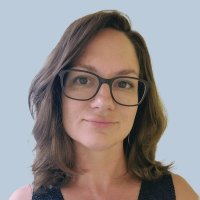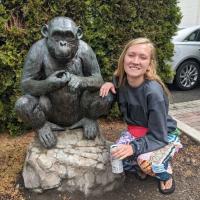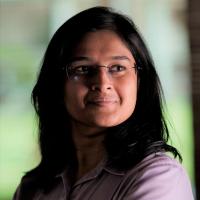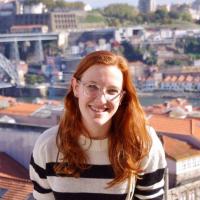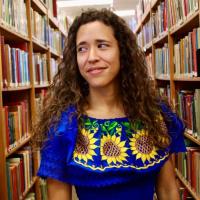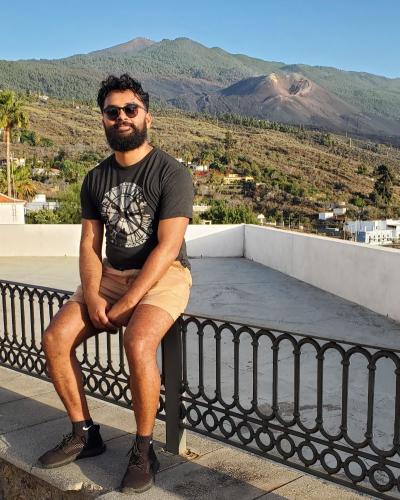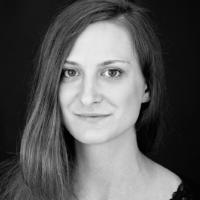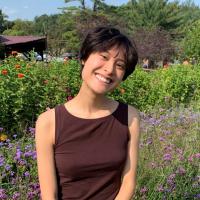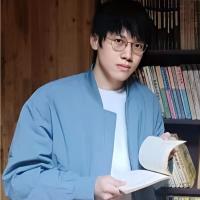|
Audrey Baker azb4@cornell.edu | Audrey's research interests center on emerging sociotechnical food regimes, including how institutional, political, technological and ecological structures mediate emerging food production strategies such as digital and cellular agriculture, how these impact and may be influenced by food sovereignty movements at different scales, which experts get to define a healthy, sustainable, just food system, and how different actors in these spaces conceptualize the roles of nature and land. Audrey is an employee degree PhD student in the Department of Science and Technology Studies who is also on staff and an instructor with Cornell’s Master of Public Health Program. |
|
Josie Callahan | My research interests include: Human-nonhuman primate relationships (particularly how humans come to know and understand nonhuman primates as scientific objects/subjects, as sources of knowledge production, and as subjective beings); animal studies; extinction studies; conservation and more-than-human biopolitics; environmental humanities; environmental and animal ethics; phenomenology and existential philosophy; feminist STS. I received my BA in Philosophy and Anthropology from the University of Pittsburgh and my MSc in Primate Behavior from Central Washington University. I love collaging, the X-files, and spending time with my three kitties: Dani, B, and Kafka |
| Amy Cheatle ac2288@cornell.edu | Amy investigates how computational systems and practices change time-honored forms of craftwork. Her ethnographic field research focuses on a trio of case studies; the fine art furniture studio adopting digital fabrication technologies, the operating room introducing robotic surgical procedures, and the luthier’s workshop combining both empirical and data-driven techniques in contemporary violinmaking. Together these cases reveal emergent forms of artisanal practice, reconfigurations to teamwork and collaboration, and unique and interdisciplinary pathways for transmitting knowledge relevant to larger audiences interested in human-computer interaction and science and technology studies. |
|
Brume Dezembro Iazzetti | Brume is a Ph.D. student interested in the emergence of reproductive biotechnologies, including its speculative usages and present-day political and scientific controversies, as well as the history of eugenics in nation-building. Fascinated by borders, frontiers, boundaries, limits, and other in-betweens, her research seeks to connect Latin American transfeminism with Decolonial and Intersectional STS. She holds a BA in Social Sciences and MSc in Social Anthropology at UNICAMP, and an MA in Public History, with a qualification in Historical Politics, at the Erasmus Mundus HIPS program. |
| Mehmet Ekinci me332@cornell.edu | Mehmet's interests include: Sociology and anthropology of science-technology; laboratory studies; intellectual histories of life sciences, biomedicine, biotechnology and bioinformatics; social and critical theory; economics of science; new institutionalism; public engagement with science; science journalism; science fiction and STS. |
| Rebecca Harrison rah288@cornell.edu | Becca's research considers how agricultural biotechnologists are deliberate, ethical actors navigating both a complex regulatory structure and increasing public concern about genetic engineering. Specifically, she focuses on academic scientists at land-grant institutions (like Cornell), and is using tools from STS to imagine a more reflective type of public engagement around technology development. |
|
Hai Ri (Sophia) Jeon | Sophia is a Ph.D student interested in contemporary practices and technologies of medicine and biomedicine. More specifically, her work is concerned with how social markers such as race, gender, and class shape and are reified by existing knowledge systems in the medical field. She hopes to understand the micropolitical and macropolitical strands that compose the increasingly complex and dis-unified picture of contemporary American healthcare as the relations between realities and normativities are often represented by friction across multiple scales. |
|
Yuxin Jia | Yuxin’s current research focuses on labor and environmental issues in computing infrastructures. She’s curious about people’s alternative technological solutions and imaginaries beyond designers’ intentions. She also has a broad interest in anthropology, human-computer interaction, and media studies. |
|
Barkha Kagliwal | Barkha's dissertation is tentatively titled, "Understanding Processing: Food and Technoscience in India". One solution to the problem of food wastage in India could be processing, the thesis analyzes how processing technologies are shaping the food system. Using the case of Mega Food Parks, it illuminates interactions between food processing technologies, infrastructures and national policy design in changing the agri-food sector. Keywords: Sociology of technology; economic sociology; market sociology; food studies; food quality; Indian food system; food processing technologies. |
|
Faridah Laffan | Faridah's work on the history of "Biblical archeology" explores how, when, and why late-Victorian archaeologists justified their scholarship in religious terms. Her areas of interest include: relationships between religion, science, and empire; race, gender, class, and religion in the production of new knowledge; and public understandings of science in museums and the press.
|
|
Lissette Lorenz | Lissette Lorenz is a PhD candidate in the Department of Science and Technology Studies with a background in environmental studies, theater, and dance. They explore the environ/mental health challenges that more-than-human communities face in our current age of planetary crises. Drawing from critical social theories across the humanities and social sciences, Lissette employs transdisciplinary and experimental qualitative methods found in activist scholarship to collectively address Earthly un/worlding. Their writing on community-based theater for environmental justice can be found in the Routledge Handbook for Art, Science, and Technology Studies and in JCOM: Journal of Science Communication. Their research is funded in part by the Mellon Foundation and the National Science Foundation. For more information, visit their website: https://lissettelorenz.com/. |
| Vishal Nyayapathi vn82@cornell.edu | Vishal is interested in how agroforestry management works on the ground in contemporary Sri Lanka. This project speaks to discussions in the environmental humanities, postcolonial science studies and South Asian area studies. They received a B.A. in Anthropology from The George Washington University.
|
|
Donny Persaud | Donny is interested in how internet infrastructures construct and reshape understandings of place, nature, and the environment. His dissertation research explores emerging issues associated with low-earth-orbit satellite internet infrastructure, examining how stakeholders including telecom operators, astronomers, legal bodies, and activists mobilize overlapping and conflicting visions of nature to argue for varying levels of environmental protection for outer space. |
|
Andra Sonia Petrutiu | Combining STS and sociocultural anthropology, Sonia’s current research is theoretically situated at the intersection of infrastructure studies, technopolitics, and postcolonial science studies. Framed by a general concern with climate science and climate politics, she discusses how Indian climate modeling and supercomputing shape and are shaped by far-reaching technopolitical trajectories, changing discourses of self-reliant development, and the re-production of the postcolonial nation as well as state power via articulations of technoscientific prowess. Another strand in Sonia’s work uses Indian climate modeling as an empirical case to examine postcolonial science studies vis-à-vis critical discourses on the Anthropocene in order to analyze the multilayered interplay between climate change, scientific knowledge and geopolitical power. |
|
Jai Vipra | Jai (pronounced Zaai) works on aspects of the global history of semiconductor device design and production, particularly techniques like photolithography and the materials and labour required to enable them. She is interested in political economy approaches to the production of science and technology. Jai has an undergraduate degree in economics from the University of Mumbai and a Masters in Public Policy from the University of Oxford. Before starting her PhD, Jai worked in India and the UK on technology policy, especially AI policy, computational infrastructures, and market concentration. |
|
Elexis Williams | Elexis Trinity is a PhD student in the field of Science and Technology Studies with a background in area studies, human and nonhuman rights. While their master’s research focused on Russian water policy during the latter twentieth and early twenty-first centuries, their current research interests mobilize around histories of science, environmental history/STS and knowledge-making, with a particular focus on the sea in human history, the making of underwater laboratories, and the spatialization of the oceans and seas in scientific practice, ecotourism, and conservation. Currently reading: anything about oceanography, marine archeology, or seascape epistemologies. |
|
Alena Zhang | Alena studies the co-constitution of race and ethnicity with agricultural supply chains, focussing in particular on Asian American farmers in the continental US. She is interested broadly in feminist science studies, multispecies ethnography, Asian/American studies, and environmental history. Previously, she conducted research on water buffalo breeds and breeding in the Philippines, examining the more-than-human reach of the biopolitics of milk. She is affiliated with the Southeast Asia program at Cornell. She loves the curry split pea soup at Zeus. |
|
Xiulin Zhang | Xiulin Zhang (pronounced “Show-leen Djang”) explores the acoustic dimensions of China's state-making in the 20th century, especially the entangled efforts to standardize both musical tones and linguistic tones in the creation of a national language and a national music. He is also interested in broader topics in sound studies and science studies within postcolonial contexts, employing historical and sociological methodologies. He holds a M.Sc. in History of Science and Technology from Tsinghua University and a joint M.A. in STS from Institute of Science Tokyo. |
|
Yue Zhao | Yue Zhao is a PhD Candidate in Science and Technology Studies. Her dissertation project investigates the intersection of medical history and history of information technology in modern China. She is interested in examining technical embodiment through feminist STS perspectives. She received her MA in Media, Culture, and Communication at New York University. View Yue's website. |
 Department Homepage
The College of Arts & Sciences
Department Homepage
The College of Arts & Sciences
